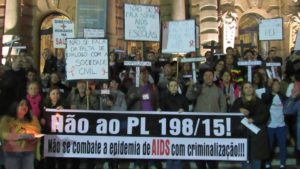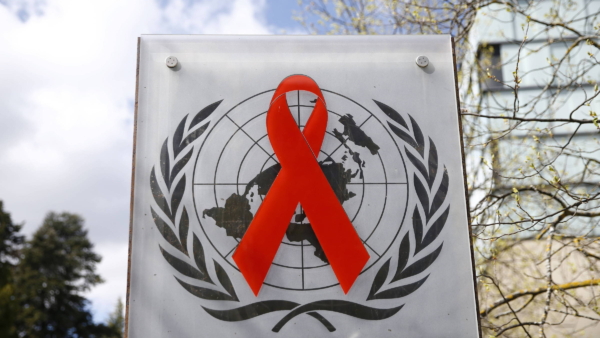Overview
The Penal Code of Brazil includes general provisions criminalising the spread of venereal diseases and serious illnesses, along with general bodily harm laws including aggravated homicide, which have been used to prosecute cases of HIV ‘exposure’ and transmission. There have been recent attempts to introduce provisions which specifically criminalise HIV transmission, but these attempts have been so far unsuccessful and there remain no HIV-specific laws.
Article 130 of the Penal Code criminalises perceived ‘exposure’ to contagion of venereal diseases through sexual intercourse or acts where the person ‘knows or must know’ that they carry the infection. The penalty under this provision is three months to one year’s imprisonment or a fine, or one to four years’ imprisonment and a fine where the accused intended to transmit the disease.
Article 131 prohibits a person from undertaking acts which are capable of transmitting a serious illness. The offence carries a penalty of imprisonment for one to four years and a fine.
Furthermore, Article 267 criminalises the causing of an ‘epidemic by spreading pathogenic germs’. It carries a penalty of ten to fifteen years’ imprisonment, and the sentence is doubled where death is caused. Article 268 makes it an offence to violate orders by health authorities which are aimed at preventing the spread of contagious diseases, with a penalty of one month to one year imprisonment and a fine, increased by one third if the offender is a public health official, doctor, pharmacist, dentist or nurse.
General harm provisions may also apply. Article 129 (‘bodily injury’) makes it an offence to ‘offend the bodily integrity or health of another’, elevated to ‘serious bodily injury’ where a ‘incurable illness’ is transmitted. A penalty of two to eight years’ imprisonment applies.
The first known prosecution under general laws took place in 1995, when a woman was sentenced under Article 131 to a year’s imprisonment after neglecting to inform her partners that she had HIV, despite testifying that she had always required the use of condoms.
A number of other cases have occurred in more recent years. In 2018 a man was sentenced to seven years’ imprisonment under Brazil’s ‘serious bodily injury’ provision (Article 131) after allegedly having sex without a condom with at least two women and failing to inform them that he was HIV-positive. It was alleged that the man was intent on transmitting HIV to his partners, however this appears to be predicated merely on his non-disclosure and not wearing a condom. HIV was not transmitted. In 2021, his sentence was extended to thirteen years.
Cases have also occurred in which an accused has been held responsible for the death of a partner from AIDS complications. In 2019, two cases were publicised involving the death of women following an alleged failure by accused to disclose HIV status. In the first, police claim that a man failed to disclose his HIV status to six women, including his wife who ultimately died after he transmitted HIV to her. He was charged under Article 131 and held under preventative detention, but the outcome of the case is not known. In the second case, police charged a man with aggravated homicide as they alleged that he transmitted HIV to his partner with intent to kill her, and then prevented her from receiving treatment. The outcome in this case is also not known. Notably, in both cases it is claimed that the accused forged documents to hide their HIV status, suggesting a desire to mislead. However, people living with HIV have been held liable for death without evidence of covering up their status. In a further case in 2022, a man was sentenced to 12 years’ imprisonment for manslaughter after the death of his wife from complications from AIDS, after he allegedly failed to disclose his HIV status during their relationship.
In March 2022, a 38-year-old man was arrested and charged with ‘serious bodily injury’ (Article 131) after he was accused by a total of nine women of “deliberately infecting them with HIV”. The man was allegedly diagnosed with HIV in 2019, but did not disclose his status to them or use any protection. At least three of the women who filed complaints subsequently tested positive for HIV.
In October 2024, a case was reported in which HIV-positive organs were transplanted to six patients after a ‘breach of quality control’ procedures. The private laboratory which handled the organs had reduced testing from daily to weekly, resulting in HIV transmission. Two employees of the laboratory were arrested, and police were seeking two more people as part of the operation.
Several attempts have been made to introduce HIV-specific laws in Brazil, often on the back of high profile cases of alleged HIV ‘exposure’ or transmission, but have so far been unsuccessful.
In April 2015, a bill was brought before Parliament that would amend Article 1 of Law No. 8072 of July 25, 1990, which covers heinous crimes, to include people who ‘transmit and infect consciously and deliberately others with the AIDS virus (sic)’ alongside a list of crimes which includes murder, extortion, rape, child exploitation and spreading an epidemic that results in death. The offence carries a penalty of two to eight years’ imprisonment and a fine. The introduction of the bill followed a media panic spurred by a newspaper article published in February 2015 that suggested that some men were deliberately passing on HIV to unknowing partners, and further exacerbated in a sensationalised TV programme aired in March. In 2017, following significant pressure and advocacy work, the bill was eventually dropped and to date this amendment has not been made.
Two high-profile cases in 2009 also stimulated calls for the introduction of specific laws criminalising HIV transmission, which were eventually rebuked by the Ministry of Health. Both cases involved heterosexual men having sexual intercourse with women without disclosing their HIV status. In the first, the accused was initially found guilty of attempted murder for transmitting HIV to his mistress without disclosing his status. Following an appeal the charge was lowered to assault and he was sentenced to two and a half years’ imprisonment. The second also led to a charge of attempted murder for a man who had sexual intercourse with three women without disclosing his status, two of whom subsequently tested positive for HIV. The outcome of this case is not known.
More recently, in March 2024, a proposal was made by Congressman Geraldo Resende to provide for enhanced sentences under Articles 129 and 131 where transmission occurs between spouses. The bill would allow for an increase in sentences from one to two thirds. Although the report and the explanatory notes of the bill suggest that it is aimed at HIV, the proposed amendments do not specifically mention HIV and apply generally to ‘incurable’ or ‘serious’ illnesses. The bill is currently under consideration.
Laws
Penal Code
Article 130. Danger of venereal contagion
Exposing someone, through sexual intercourse or any libidinous act, to the contagion of venereal disease, of which he knows or must know that he is contaminated:
Penalty – imprisonment, from three months to one year, or fine.
(1) If it is the agent’s intention to transmit the disease:
Penalty – imprisonment, from one to four years, and fine.
(2) Only proceed through representation.
Article 131. Danger of contagion from serious illness
To practice, with the purpose of transmitting to another serious illness that he is contaminated, an act capable of producing the contagion:
Penalty – imprisonment, from one to four years, and fine.
Article 267. Epidemic
To cause an epidemic by spreading pathogenic germs:
Penalty – imprisonment, from ten to fifteen years.
(1) If death results from the fact, the penalty is applied twice.
(2) In the case of guilt, the penalty is imprisonment, from one to two years, or, if death results, from two to four years.
Article 268. Infringement of preventive health measure
Infringing the determination of the public authorities, aimed at preventing the introduction or spread of a contagious disease:
Penalty – imprisonment, from one month to one year, and fine.
Sole paragraph – The penalty is increased by one third, if the agent is a public health worker or exercises the profession of doctor, pharmacist, dentist or nurse.
Penal Code
Article 129. Bodily injury
Offending the bodily integrity or health of another:
Penalty – detention, from three months to one year.
Serious bodily injury
(1) If it results in:
I – Incapacity for normal occupations for more than thirty days;
II – danger to life;
III – permanent debility of limb, sense or function;
IV – acceleration of childbirth:
Penalty – imprisonment, from one to five years.
(2) If it results in:
I – permanent incapacity for work;
II – incurable illness;
III – loss or disablement of limb, sense or function;
IV – permanent deformity;
V – abortion:
Penalty – imprisonment, from two to eight years.
Further resources
Document in Portuguese used to advise the offices of the Public Defender, Public Ministry, Judiciary and Legislative Power on the science of HIV transmission, especially through sexual intercourse. The document includes sections on U=U, selected cases of HIV criminalisation, brief study of criminalising bills, the 2021 UNDP report on HIV criminalisation, and technical notes from the Health Ministry and the Health Secretariat of São Paulo State on the criminalisation of HIV transmission.
Acknowledgements
Our thanks to Cláudio Pereira, lawyer (GIV, Group for life Incentive) & Prof Jorge Beloqui (IME-USP), member of GIV, ABIA and The National Network of PWHA (RNP+) for their research assistance to confirm current relevant legislation.
HIV Justice Network's Positive Destinations
Visit the Brazil page on Positive Destinations for information on regulations that restrict entry, stay, and residency based on HIV-positive status, as well as access to HIV treatment for non-nationals.










